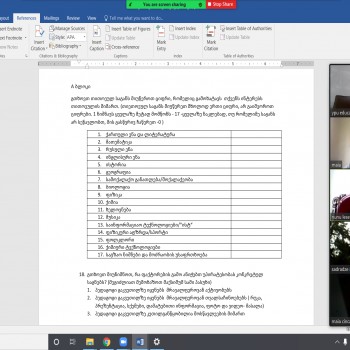Current project
Young Pedagogues' Union has 6 partner kindergartens and 7 schools in Guria region within the framework of the current project. It is noteworthy that the organization has many years of experience working with schools and kindergartens, therefore, it can be said that the main problems facing the education system today are quite clear. In the current project, it was important for the representatives of each partner institution to assess the challenges facing their own school / kindergarten and to find ways to overcome these barriers. Based on experience, the organization has developed a strategy for working with partner institutions to make the process structured, to demonstrate the logic of the work, and to achieve maximum involvement of school / kindergarten representatives and parents in the development process, even in a pandemic.
Initially the self-assessment process started. A syllabus was created for partner schools / kindergartens, which included the following training issues:
1. Legislative review - review of existing legislation, standards
2. Violence against children - safety and referral procedures
3. The importance of the self-assessment process
4. Research Methodology - Quantitative and Qualitative Research Methods
5. Prepare a self-assessment report
In parallel with the above trainings, self-assessment report of 11 educational institutions was prepared with continuous consultation of the component cooperation (5 schools - Gurianta village, Naruja village, Kviriketi village, Meria village and Gutiri village; 6 kindergartens - Laituri village, Naruja village, Nagomari village, Shemokmedi Village , Village Nigvziani).
In addition, representatives of two other partner schools of the organization (Creator village and Nagomari village), which are already collaborating with the organization for the second project cycle, after preparing a six-year strategic plan, worked on one challenge important for their school and community and created a concept. The concept of the Shemokmedi School is to create and implement social policies in the community, and Nagomari - to empower parents and involve them in school life. These documents have been prepared, approved and are currently being implemented.
One of the main topics of the education component this year was gender and gender socialization, about which a research report was prepared, which was later based on the "School Gender Policy Development Guide". With the help of this document, the representatives of the partner schools prepared a school gender policy framework document, which is being processed.
It should be noted that all the documents that the partner educational institutions have been working on during this one year have been prepared with the active consultation and involvement of the education component.

